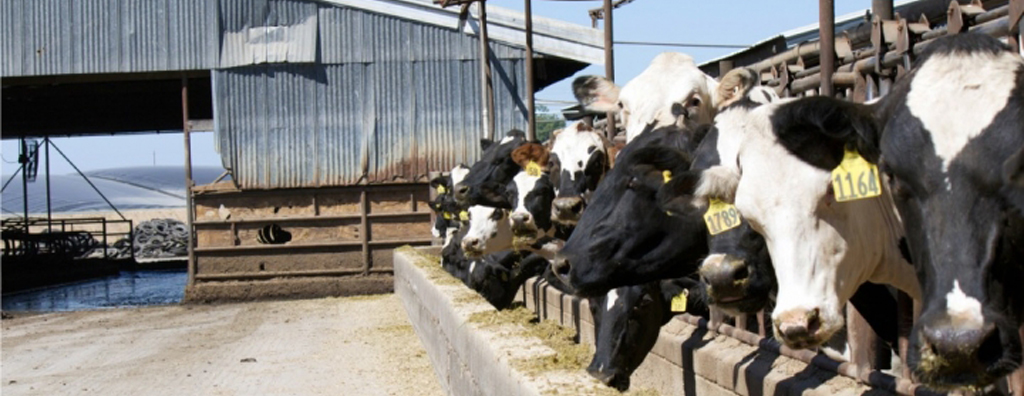
California Dairy Digester Helping to Balance the Grid
Kasey Krifka, The Climate Trust
As published by Climate Action Reserve – March 7, 2016
The Climate Trust’s Van Warmerdam project is an anaerobic digester in Sacramento County, California. Maas Energy Works—a company specializing in turning methane gas generated by cow manure into electricity—constructed the digester on-site at the Van Warmerdam Dairy.
This facility that milks 1,000 cows became operational in July 2013, with the first round of offsets delivered in December 2015. The Climate Trust has committed to buy the methane emissions that are not released into the atmosphere due to the installation of the anaerobic digester, and has already retired the first delivery of credits.
Farms have historically scraped their manure into uncovered lagoons, which generate methane and release it to the atmosphere. The digester covers the existing lagoon at the dairy with a flexible, high-density polyethylene cover, which stores up to two days of biogas production. Manure from the lagoon is piped to a covered digester tank which captures and combusts this methane in a generator which delivers electricity to the grid. Essentially, the digester is used like a battery, combusting the gas to generate electricity only during peak times.
“The Van Warmerdam project is a big deal for renewables,” said Peter Weisberg, Program Manager for The Climate Trust. “We don’t have power over when the sun shines or the wind blows—so balancing the grid is essential and biogas lets us do it with more renewables.”
The combined heat and power engine of the digester has a capacity of 600 kw, and the project has a twenty-year Power Purchase Agreement to sell this power and its Renewable Energy Certificates to the Sacramento Municipal Utility District. Based on a modeling of the methane emissions from the pre-digester lagoon at the Van Warmerdam Dairy, the project is anticipated to deliver 68,500 credits over a ten-year crediting period.
Biogas utilization projects such as Van Warmerdam offer a host of beneficial revenue streams for farmers, from clean energy to tipping fees to organic fertilizer. The methane destruction benefits are significant as this greenhouse gas is 84 times more powerful than carbon dioxide over a 20-year period.
The Van Warmerdam project is listed under the Climate Action Reserve (2013-2014 vintage). To date, The Climate Trust (The Trust) has retired 9,004 Climate Reserve Tonnes from the Van Warmerdam Project on behalf of our Oregon Program. Across its portfolio, The Trust has retired an impressive 615,163 Climate Reserve Tonnes from sixteen projects. Diverse project types include: Landfill Gas Capture, Livestock Gas Capture, Organic Waste Composting, and Improved Forest Management. This amount of tons retired is comparable to removing over 129,500 cars from the road for an entire year!
Throughout the duration of our partnership, Maas Energy Works has worked closely with The Trust to develop and operate projects under the rigorous quality standards of the Climate Action Reserve that benefit farms and the environment. The Trust is proud of our role in the Van Warmerdam Project and will continue to find ways to prove itself a friend of the livestock digester industry.
Overall, California has a very large and mostly unrecognized opportunity to develop biogas projects. This is The Trust’s first California project and therefore an important first step towards future work in the state with Maas Energy Works and others.
More About The Trust’s Oregon Program
As the nation’s first compliance carbon provider and manager, The Trust has a long history of meeting the unique needs of utilities and their stakeholders. We remain the only organization qualified to administer the Oregon Carbon Dioxide Standard, the first legislation in the nation to curb carbon emissions. New fossil fuel-fired power plants provide us with funding to comply with the law and we invest those funds into high-quality projects that reduce pollution.
Since its inception, The Trust has committed $31.6 million to greenhouse gas emission reduction projects across a broad array of sectors. The cornerstone of our business, the Oregon Program, has built a strong legacy of innovation that delivers results for our compliance partners and the environment year after year.
The majority of our projects and programs are locally focused, enabling The Trust to grow strong grassroots support for climate action. In fact, 56% of the money we invest on behalf of utilities stays in Oregon. Additionally, our Oregon-based projects are from diverse sectors, including transportation, renewable energy, forestry, biogas, energy efficiency, and landfill & waste.